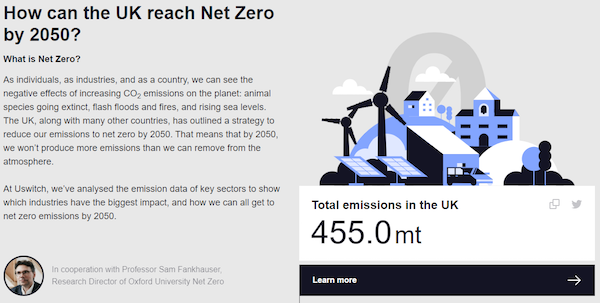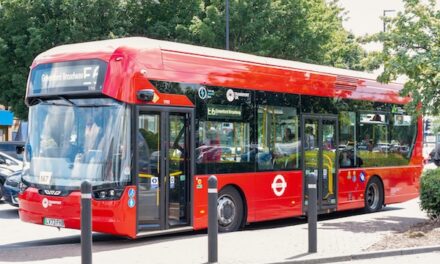- Over a quarter of the UK’s carbon emissions comes from the transport industry[3]
- Car commutes account for over one third of transport industry emissions[4]
- If commuters swapped their cars for public transport, 3.5 million tons (mt) of CO2 would be saved per year[6]
- Commuting by electric car would see a reduction of almost half in overall transport emissions[7]
- HGVs contribute 16% of CO2 production in the UK’s transport sector[8]
- Experts at Uswitch.com offer tips on how people can help towards Net Zero targets
Making small adjustments to car habits could see a large decline in carbon emissions produced by the transport industry in the UK, according to new research by Uswitch.com, the comparison and switching service[x]
The UK, along with many other countries, has outlined a government strategy to reduce emissions to net zero by 2050. That means that by 2050, the UK won’t produce more emissions than it can remove from the atmosphere.
The transport industry is the largest emitter of emissions in the UK, contributing 122.2mt of CO2 to the atmosphere[1], which is almost four times the amount produced by the waste and recycling industry[2]. This accounts for 27% of the total emissions in the UK[3].
Currently those that commute by car each day are contributing 35% of the total transport industry’s CO2 emissions[4]. With the rapid adoption of hybrid working and working from home, reducing or dropping commuting by car is becoming more of an option for many. The research further reveals that if car commuting is reduced to three times per week instead of five, emissions could be reduced by 40%, from 30.6mt to 18.4mt[5]. Furthermore, if those who did have to commute by car swapped to an EV, 3.5m tons of CO2 would be saved from entering the atmosphere[6].
Electric cars are one solution in achieving Net Zero emissions; if all passenger cars on the road were to be replaced by an EV, the UK could reduce its transport carbon emissions by 45%, and 12% of the UK’s overall CO2 emissions[7].
However, it’s not all down to the individual and their cars. Heavy Goods Vehicles (HGVs) currently contribute 16% of the total amount of CO2 produced by the transport industry[8]. If all HGVs were to switch to a hybrid fuel system, they could reduce their contribution to transport emissions by 6%[9].
Ben Gallizzi, energy expert at Uswitch.com, says:
“It’s probably no surprise that the transport industry is one of the biggest contributors of CO2 in the UK. When thinking of pollution and emissions, cars and exhaust fumes are at the front of many people’s minds.
“However, in order to start heading in the right direction, people will need to adjust the habits of a lifetime. With the increase in electric car use and hybrid or full time working from home becoming a viable option for many people, we’re seeing fewer petrol and diesel emissions from commuters, which helps contribute towards the UK’s 2050 goal of becoming Net Zero.
“In order for us to continue this downward trend in emissions, education is key. Currently over half of the UK population do not know what Net Zero is[10], highlighting a significant need for an improvement in helping people understand how they can do their part.
“Uswitch’s Net Zero 2050 resource page aims to help people understand more about the impact of different UK industries’ carbon footprint and what it means for them. By breaking down emissions data and projected outcomes people can understand more about the things they can do to help the UK reach its Net Zero goal.”
https://www.uswitch.com/gas-electricity/green-energy/net-zero/








